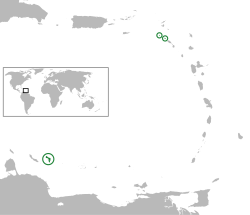| Dutch Caribbean Police Force | |
|---|---|
 | |
| Agency overview | |
| Formed | 10 October 2010 [1] |
| Employees | 5,000 |
| Annual budget | €17.6 million (2016) [2] |
| Jurisdictional structure | |
 | |
| Map of Dutch Caribbean Police Force's jurisdiction | |
| Size | 328 km2 (127 sq mi) |
| General nature | |
| Operational structure | |
| Headquarters | Kaya Libertador Simon Bolivar #4 Kralendijk, Bonaire |
| Agency executive |
|
| Departments | 5
|
| Facilities | |
| Stations | 6
|
| Website | |
| politiecn.com | |
The Dutch Caribbean Police Force (Dutch: Korps Politie Caribisch Nederland or KPCN) is the law enforcement agency of the Caribbean Netherlands.



